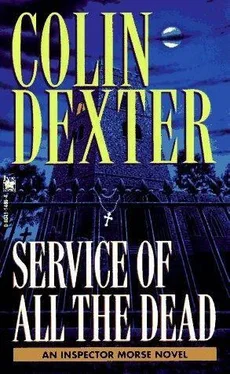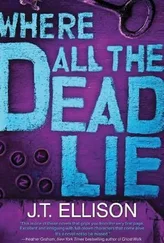Colin Dexter - Service of all the dead
Здесь есть возможность читать онлайн «Colin Dexter - Service of all the dead» весь текст электронной книги совершенно бесплатно (целиком полную версию без сокращений). В некоторых случаях можно слушать аудио, скачать через торрент в формате fb2 и присутствует краткое содержание. Жанр: Триллер, на английском языке. Описание произведения, (предисловие) а так же отзывы посетителей доступны на портале библиотеки ЛибКат.
- Название:Service of all the dead
- Автор:
- Жанр:
- Год:неизвестен
- ISBN:нет данных
- Рейтинг книги:3 / 5. Голосов: 1
-
Избранное:Добавить в избранное
- Отзывы:
-
Ваша оценка:
- 60
- 1
- 2
- 3
- 4
- 5
Service of all the dead: краткое содержание, описание и аннотация
Предлагаем к чтению аннотацию, описание, краткое содержание или предисловие (зависит от того, что написал сам автор книги «Service of all the dead»). Если вы не нашли необходимую информацию о книге — напишите в комментариях, мы постараемся отыскать её.
Service of all the dead — читать онлайн бесплатно полную книгу (весь текст) целиком
Ниже представлен текст книги, разбитый по страницам. Система сохранения места последней прочитанной страницы, позволяет с удобством читать онлайн бесплатно книгу «Service of all the dead», без необходимости каждый раз заново искать на чём Вы остановились. Поставьте закладку, и сможете в любой момент перейти на страницу, на которой закончили чтение.
Интервал:
Закладка:
Morse finished his beer and Lewis, who for once had beaten him to it, walked up to the bar. It was quite clear to him, as Morse had said, that there was a whole host of motives in the case interlocking and (if Morse were right) mutually complementary and beneficial. But where did all this hatred against Harry Josephs spring from? All right, the lot of them were getting into a terrible mess, but (again, if Morse were right) money seemed to be coping quite adequately with all their problems. And why, oh, why, all this peculiar palaver in the church? It all seemed a ridiculously complicated and quite unnecessary charade. Why not just kill Josephs and dump his body somewhere? Between them that would have been infinitely simpler, surely? And what about the actual murder itself? Morphine poisoning and a knife in the back. No. It didn't really add up.
He paid for the beer and walked circumspectly back to their table. He wouldn't be thanked if he slopped as much as a cubic millimetre on to the carpet.
Morse took a mighty swallow from his beer and continued. 'We've now got to ask ourselves the key question: how can we account for enough hatred – on somebody's part – against Harry Josephs? Because unless we can answer that question we're still groping about in the dark. And closely connected with it we've got to ask ourselves why there was all this clumsy kerfuffle at the phoney service, and also why Josephs was killed twice over. Well, let's deal with the last question first. I'm sure you've heard of those firing squads when you get, say, four men with rifles, all quite happy to shoot the poor fellow tied to the post, but three of 'em have blanks up the barrel and only one has a live bullet. The idea is that none of 'em will ever know which one actually fired the fatal shot. Well, I thought that something of the sort may have happened here. There were three of 'em, remember, and let's say none of 'em is too keen on being solely responsible for the killing. Now, if Josephs, as well as being poisoned and stabbed, had also been bashed on the head, I reckon the evidence would have pointed strongly to my being right. But we learned from the post-mortem that there were two causes of death, and not three. Somebody gives Josephs morphine in some red wine; and then somebody, either the same somebody or somebody else, stabs him in the back. Why bother to kill him twice over? Well, it may well be that two of 'em were involved in the actual murder; a division of labour could have been agreed for the reason I've just mentioned. But there was a far more important reason than that. Are you ready for a bit of a shock, Lewis?'
'Ready for anything, sir.'
Morse drained his glass. 'By Jove, the beer's good here!'
'It's your turn, sir.'
'Is it?'
The landlord had come through into the lounge-bar, and for a few minutes Lewis could hear him discussing with Morse the crass stupidity of the selectors of the England football team.
'These are on the house,' said Morse, planting the two pints carefully on the Morrell's beer-mats. (For a man proposing to treat his junior officer for services rendered, he seemed to Lewis to be getting away with things extremely lightly.) 'Where was I now? Ah, yes. You didn't ask me where I'd been today, did you? Well, I've been up to Rutland again.'
'Leicestershire, sir.'
Morse appeared not to hear. 'I made one bad blunder in this case, Lewis. Only one. I listened too much to rumour, and rumour's a terrible thing. If I tell everybody that you're having an affair with that comma-less typist of yours, you'd suddenly find yourself trying like hell to prove you weren't – even though there was absolutely no truth in it. Like they say, you throw enough mud and some of it'll stick. Well, I reckon that's what happened with Lionel Lawson. If he was a homosexual, he must have been one of the very mildest variety, I think. But once the charge had been suggested he found himself in the middle of a good deal of suspicion, and I was one of those prepared to think the worst of him. I even managed to convince myself, without the slightest shred of evidence, that when he was expelled from school it must have been because he was buggering about with some of the younger lads there. But suddenly I began to wonder. What if I'd been quite wrong? What if Lionel Lawson's old headmaster wasn't too unhappy about letting me believe what I did – because the truth of the matter was far worse ? I thought I knew what this truth was, and I was right. Today I met Meyer again, as well as Lionel's old housemaster. You see, the Lawson brothers were an extremely odd mixture. There was Lionel, the elder brother, a hard-working, studious swot, not too gifted academically, struggling along and doing his best, bespectacled even then, lacking in any confidence – in short, Lewis, a bit of a bore all round. And then there was Philip, a clever little beggar, with all the natural gifts any boy could ask for – a fine brain, good at games, popular, good-looking, and yet always idle and selfish. And the parents dote on – guess who? – young, glamour-pants Philip. It doesn't require much imagination to see the situation from Lionel's point of view, does it? He's jealous of his brother – increasingly and, finally, furiously jealous. From what I've been able to learn there was a young girl mixed up in it all, when Lionel was eighteen and Philip a year or so younger. She wasn't a brilliant looker by all accounts – but she was Lionel's girl. Until, that is, Philip decided to step in; and probably for no other reason than to spite his brother he took her away from him. It was from that point that the whole of the tragedy dates. At home, one week-end, Lionel Lawson tried to kill his brother. He tried to use the kitchen-knife, and in fact he wounded him quite seriously – in the back. Things were hushed up as far as possible and the police were quite happy to leave the situation in the hands of the school and the parents. Some arrangement was worked out, with both the boys being taken away from the school. No charge was brought, and things, so it seemed, settled down. But the records couldn't be altered, could they, Lewis? The fact was that at the age of eighteen Lionel Lawson had tried unsuccessfully to murder his brother. So if, as I said, we're looking for any festering, insatiable hatred in this case, then we've found it: the hatred that existed between Lionel Lawson and his younger brother.'
It was all very interesting and suggestive, Lewis could see that; but he couldn't really see how it affected many of the problems in the present case. Morse was going on, though, and the shock he'd spoken of was imminent.
'At first I thought that Lionel Lawson had killed Harry Josephs and had then faked his own suicide by dressing up his brother in clerical get-up and chucking him from the top of the tower. What could be neater? All you'd want was someone who would agree to a wrong identification of the body, and such a person was readily available in Paul Morris, a man who would have profited twofold from the murder of Josephs: first, by pocketing a considerable sum of money; and, second, by having Josephs' wife for himself. But you made the point to me yourself, Lewis, and you were absolutely right: it's one helluva job to dress up a dead man in someone else's clothes. But it's not an impossible job, is it? Not if you're all prepared for the difficulties and if you've got plenty of time. But in this particular instance you were right, I'm convinced of that. It was Lionel Lawson, not his brother Philip, who fell from the tower last October. In his own conscience Lionel must have realised that he'd done something so terrible and so unforgivable that he just couldn't live with it any longer. So he took his spectacles off, put them in their case – and jumped. And while we're on this identification business, Lewis, I must confess I had my fair share of doubts about whether the body we found on the tower really was Paul Morris. If it wasn't, the possibilities were staggeringly interesting. But, although we've no satisfactory identification as yet, you can take my word for it that it was Paul Morris. Yes, indeed. And so at long last I began to shelve all these fanciful theories, and I just looked at the simple possibility that all of us had completely ignored from the very beginning. Ruth Rawlinson herself came very near to telling the truth and giving the game away in that ridiculous statement of hers when she said that she was prepared to tell one lie – one lie. She told us, as you'll remember, that this lie was about the service in St Frideswide's that never took place, and about her silence in the plotting of Harry Josephs' murder. But listen, Lewis! That wasn't the real lie at all. The real lie was about something else: she lied about the identification of the body lying dead in St Frideswide's vestry that night in September! That was her one big lie. Because, you see, the body found murdered that night was not the body of Harry Josephs at all! It was the body of Lionel Lawson's brother – Philip Lawson.'
Читать дальшеИнтервал:
Закладка:
Похожие книги на «Service of all the dead»
Представляем Вашему вниманию похожие книги на «Service of all the dead» списком для выбора. Мы отобрали схожую по названию и смыслу литературу в надежде предоставить читателям больше вариантов отыскать новые, интересные, ещё непрочитанные произведения.
Обсуждение, отзывы о книге «Service of all the dead» и просто собственные мнения читателей. Оставьте ваши комментарии, напишите, что Вы думаете о произведении, его смысле или главных героях. Укажите что конкретно понравилось, а что нет, и почему Вы так считаете.












